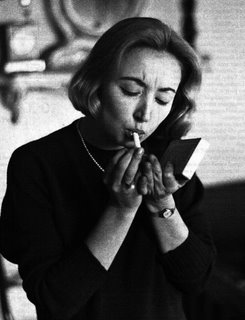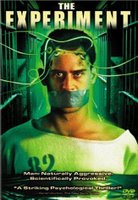firebrand journalist orianna fallaci dead
 Italian journalist and writer Orianna Fallaci died today.
Italian journalist and writer Orianna Fallaci died today. I read an amazing but frustrating profile of her in the New Yorker recently. She was bold and pugilistic, questioning world leaders unflinchingly. But it seems that with age, her attacks became blunter, until toward the end she became obsessed with railing against Islam as a whole, which she thought was engulfing and destroying European culture.
Anyway, at her height, she was a terror—in the best meaning of the world. Here's the part of the New Yorker interview about her famous interview with the Ayatollah Khomeini, soon after he took power in the 1979 Iranian revolution.
Fallaci’s interview with Khomeini, which appeared in the Times on October 7, 1979, soon after the Iranian revolution, was the most exhilarating example of her pugilistic approach. Fallaci had travelled to Qum to try to secure an interview with Khomeini, and she waited ten days before he received her. She had followed instructions from the new Islamist regime, and arrived at the Ayatollah’s home barefoot and wrapped in a chador. Almost immediately, she unleashed a barrage of questions about the closing of opposition newspapers, the treatment of Iran’s Kurdish minority, and the summary executions performed by the new regime. When Khomeini defended these practices, noting that some of the people killed had been brutal servants of the Shah, Fallaci demanded, “Is it right to shoot the poor prostitute or a woman who is unfaithful to her husband, or a man who loves another man?” The Ayatollah answered with a pair of remorseless metaphors. “If your finger suffers from gangrene, what do you do? Do you let the whole hand, and then the body, become filled with gangrene, or do you cut the finger off? What brings corruption to an entire country and its people must be pulled up like the weeds that infest a field of wheat.”
Fallaci continued posing indignant questions about the treatment of women in the new Islamic state. Why, she asked, did Khomeini compel women to “hide themselves, all bundled up,” when they had proved their equal stature by helping to bring about the Islamic revolution? Khomeini replied that the women who “contributed to the revolution were, and are, women with the Islamic dress”; they weren’t women like Fallaci, who “go around all uncovered, dragging behind them a tail of men.” A few minutes later, Fallaci asked a more insolent question: “How do you swim in a chador?” Khomeini snapped, “Our customs are none of your business. If you do not like Islamic dress you are not obliged to wear it. Because Islamic dress is for good and proper young women.” Fallaci saw an opening, and charged in. “That’s very kind of you, Imam. And since you said so, I’m going to take off this stupid, medieval rag right now.” She yanked off her chador.
In a recent e-mail, Fallaci said of Khomeini, “At that point, it was he who acted offended. He got up like a cat, as agile as a cat, an agility I would never expect in a man as old as he was, and he left me. In fact, I had to wait for twenty-four hours (or forty-eight?) to see him again and conclude the interview.” When Khomeini let her return, his son Ahmed gave Fallaci some advice: his father was still very angry, so she’d better not even mention the word “chador.” Fallaci turned the tape recorder back on and immediately revisited the subject. “First he looked at me in astonishment,” she said. “Total astonishment. Then his lips moved in a shadow of a smile. Then the shadow of a smile became a real smile. And finally it became a laugh. He laughed, yes. And, when the interview was over, Ahmed whispered to me, ‘Believe me, I never saw my father laugh. I think you are the only person in this world who made him laugh.’ ”
Fallaci recalled that she found Khomeini intelligent, and “the most handsome old man I had ever met in my life. He resembled the ‘Moses’ sculpted by Michelangelo.” And, she said, Khomeini was “not a puppet like Arafat or Qaddafi or the many other dictators I met in the Islamic world. He was a sort of Pope, a sort of king—a real leader. And it did not take long to realize that in spite of his quiet appearance he represented the Robespierre or the Lenin of something which would go very far and would poison the world. People loved him too much. They saw in him another Prophet. Worse: a God.”
Upon leaving Khomeini’s house after her first interview, Fallaci was besieged by Iranians who wanted to touch her because she’d been in the Ayatollah’s presence. “The sleeves of my shirt were all torn off, my slacks, too,” she recalled. “My arms were full of bruises, and hands, too. Do believe me: everything started with Khomeini. Without Khomeini, we would not be where we are. What a pity that, when pregnant with him, his mother did not choose to have an abortion.”













0 Comments:
Post a Comment
<< Home